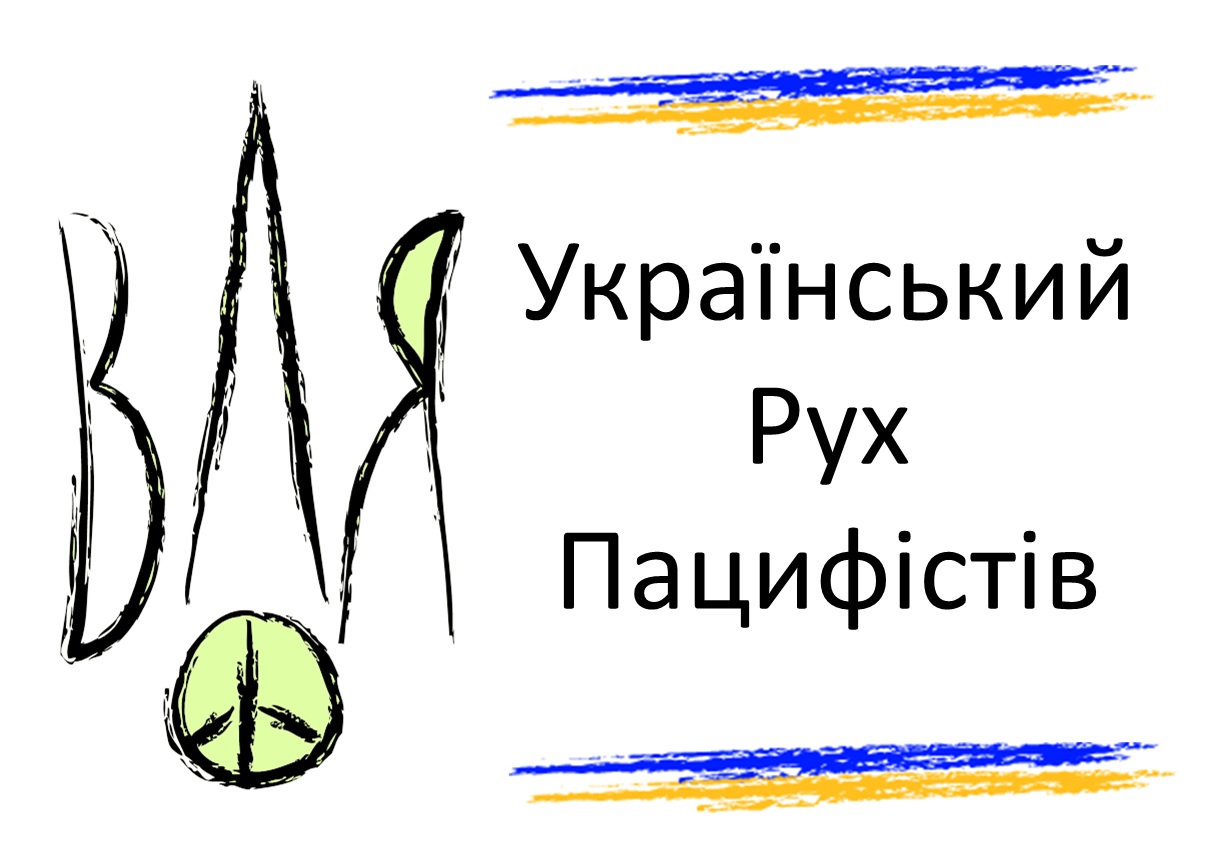
Condemnation of All Military Actions
On the Sides of Russia and Ukraine
Ukrainian Pacifist Movement
The Ukrainian Pacifist Movement condemns all military actions on the sides of Russia and Ukraine in the context of current conflict. We call the leadership of both states and military forces to step back and sit at the negotiation table. Peace in Ukraine and around the world can be achieved only in a nonviolent way.
War is a crime against humanity. Therefore, we are determined not to support any kind of war and to strive for the removal of all causes of war.
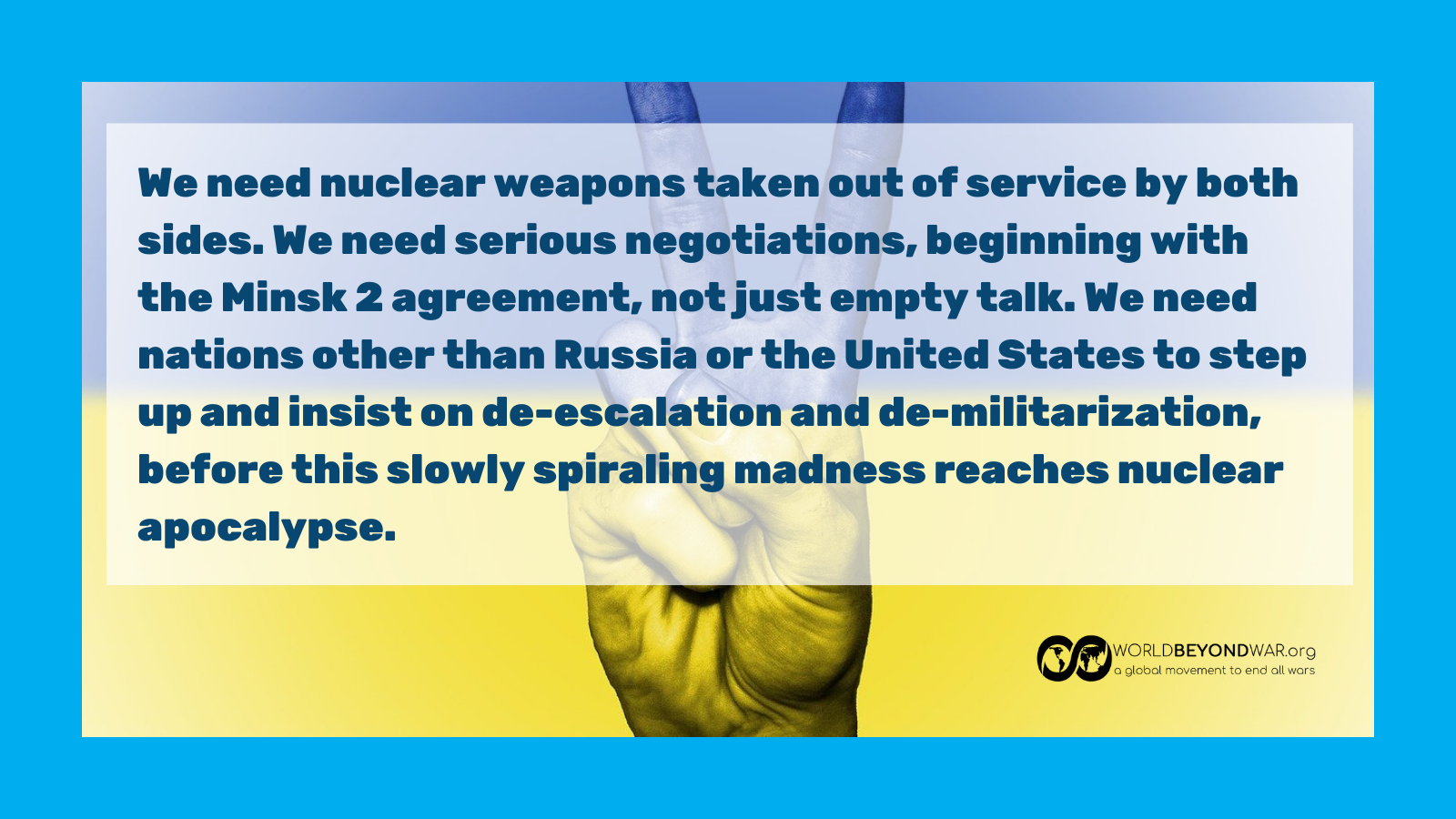
No, No, No to War
(February 24, 2022) — President Biden is half right when he refers to “an unprovoked and unjustified attack by Russian military forces” — unjustified indeed, unprovoked not in the least. Two sides have been escalating this conflict for years, each claiming to be acting defensively, each provoking the other.
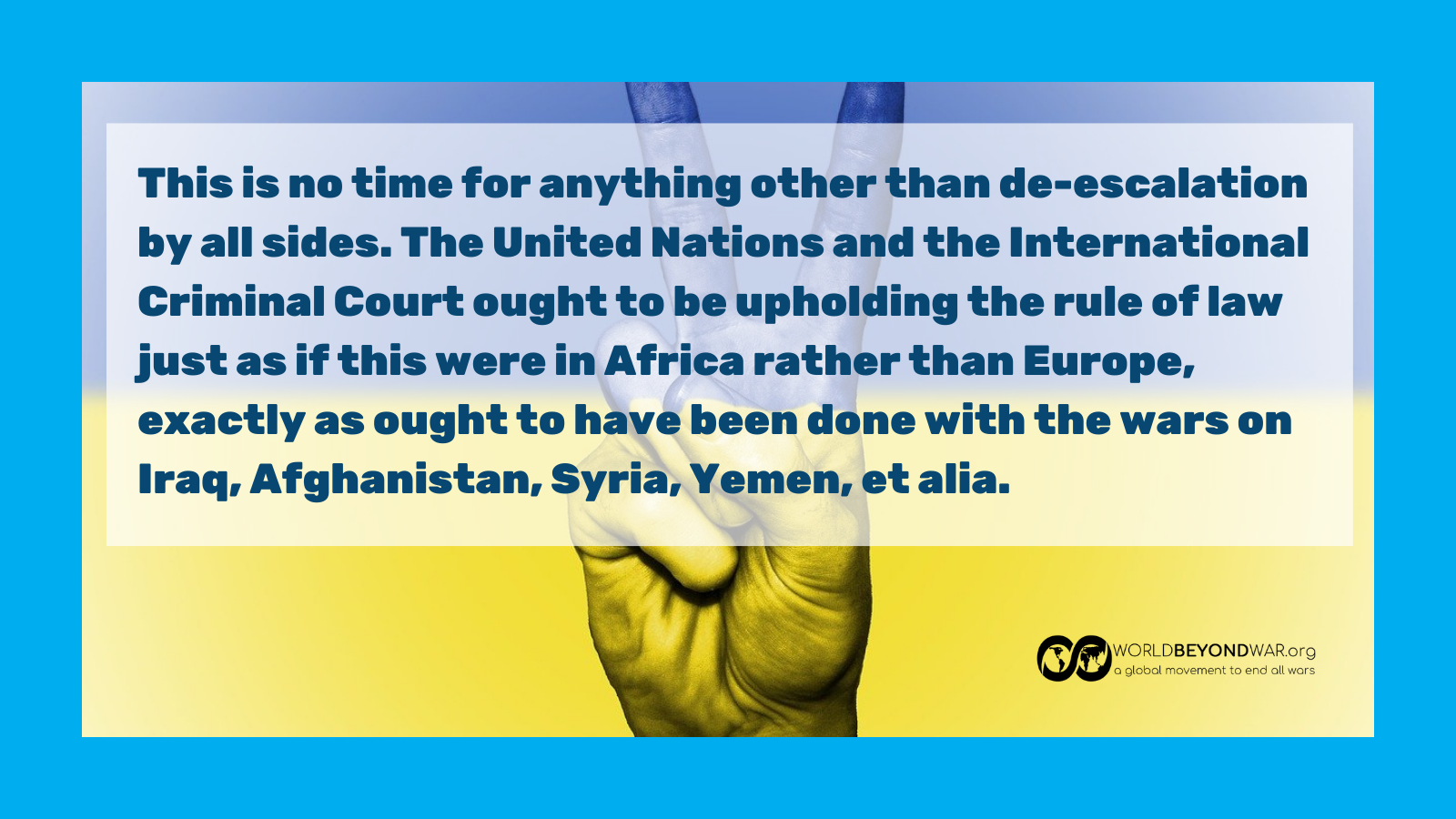
The NATO nations’ weaponry and forces that are now imagined as a solution are also the original source of the conflict. It is right to grow indignant now about Ukraine’s “sovereignty,” but so would it have been during the US-backed coup eight years ago that has endangered Russian-speaking Ukrainians.
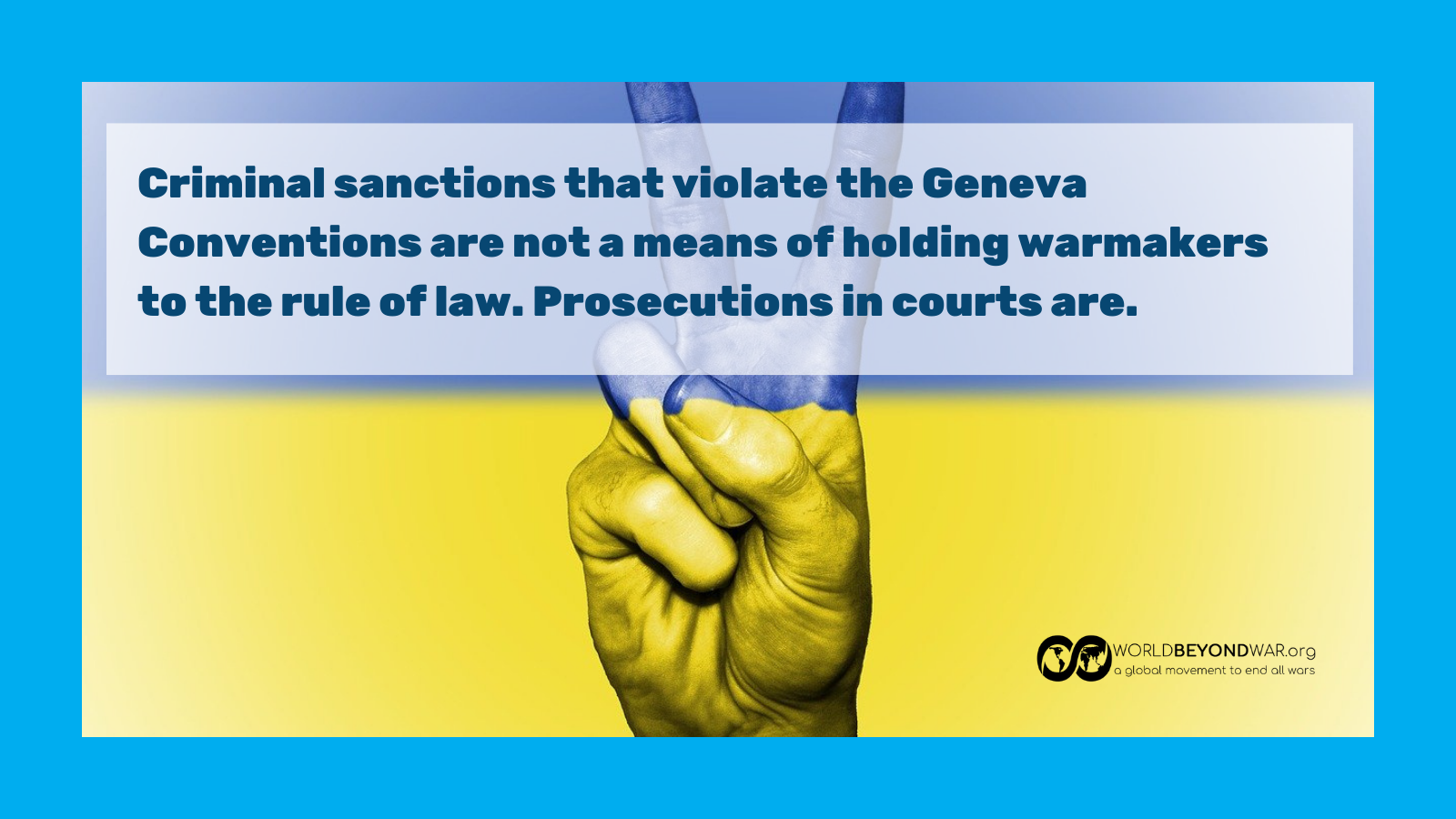
This is no time for anything other than de-escalation by all sides. The United Nations and the International Criminal Court ought to be upholding the rule of law just as if this were in Africa rather than Europe, exactly as ought to have been done with the wars on Iraq, Afghanistan, Syria, Yemen, et alia. Criminal sanctions that violate the Geneva Conventions are not a means of holding warmakers to the rule of law. Prosecutions in courts are.
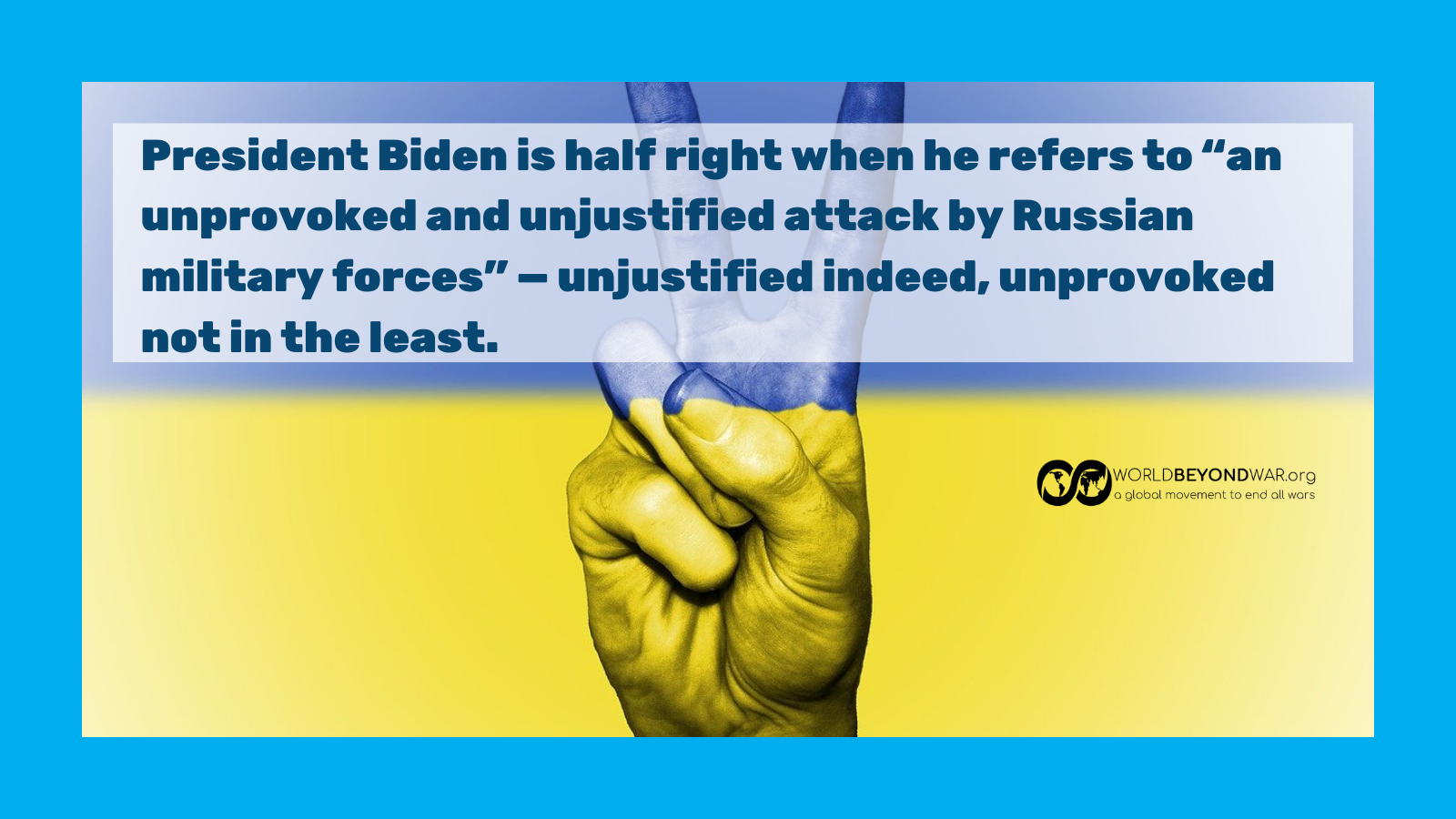
We need nuclear weapons taken out of service by both sides. We need serious negotiations, beginning with the Minsk 2 agreement, not just empty talk. We need nations other than Russia or the United States to step up and insist on de-escalation and de-militarization, before this slowly spiraling madness reaches nuclear apocalypse.
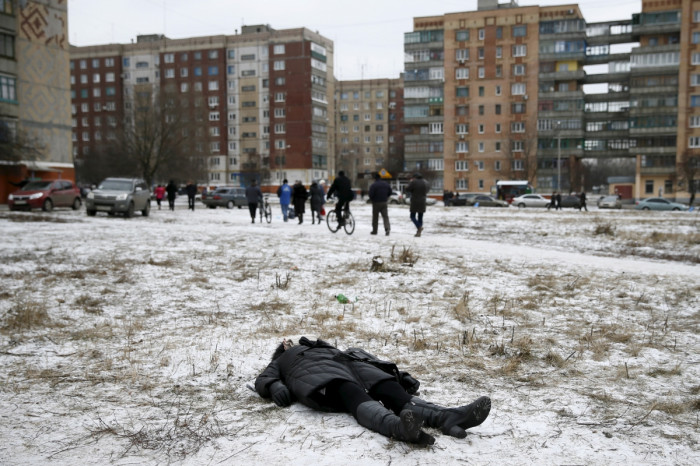
Statement on Ukraine
RootsAction.org
(February 24, 2022) — The world desperately needs a single standard of accountability to prevent the crime of war — a crime that the Russian government is now committing in Ukraine and the US government continues to commit elsewhere as part of the ongoing “war on terror.”
RootsAction condemns crossing borders and killing, no matter what the nationality of the military forces. Hypocritical condemnations in both directions ring hollow, as when President Biden late Wednesday night insisted that “the world will hold Russia accountable.”
Most of the world has long been trying to hold reckless war-makers accountable. The latest actions by the Russian government will cause death and suffering, and those actions will further destabilize global security while rendering institutions like the United Nations even more powerless.
As always, in this instance the aggressor has couched its aggression by claiming to act in defense, as the US government often has. At this extremely dangerous moment in world history, diplomacy — not warfare — remains the only hope.
In the process, the perilous history of NATO’s eastward expansion and the threat of further expansion must be faced. Fueling a conflict between the two nuclear superpowers is insanity.

CPDCS Condemns Russia’s
Military Aggression Against Ukraine
The Campaign for Peace Disarmament and Common Security
The bombardments and invasion must end immediately with a ceasefire, the withdrawal of all foreign troops, and renewed comprehensive diplomacy.
There are no military solutions to either the Ukraine or European-wide crises, only a political solution based on the common security principle that security cannot be achieved against one’s rival, but only with that rival. Nations must not to strengthen their security at the expense of the security of other states.
Work for peace and justice.

ICAN Condemns Russia’s Invasion of Ukraine
The International Campaign to Abolish Nuclear Weapons (ICAN)
The International Campaign to Abolish Nuclear Weapons, the 2017 Nobel Peace Prize Laureate strongly condemns the Russian invasion of Ukraine and Putin’s threat to use nuclear weapons. War is never acceptable and Russian attacks on Ukraine, particularly using nuclear weapons, will have catastrophic consequences for civilians.
The international community must stand united in ensuring that we protect and support civilians, and strongly reject the violations of international law by Russia.
While all wars are unacceptable, ICAN warns that the recent Russian behaviour risks escalating the conflict to one involving nuclear weapons. Last week, Putin conducted a strategic nuclear weapons exercise, practising dropping weapons of mass destruction on civilians with intercontinental ballistic missiles, submarine launched missiles and bombers.
Even more concerningly, this morning Putin stated that: ”No matter who tries to stand in our way… Russia will respond immediately, and the consequences will be such as you have never seen in your entire history,” in a thinly-veiled threat to use nuclear weapons.
This amounts to threats to use nuclear weapons, as prohibited under the Treaty on the Prohibition of Nuclear Weapons. It is clear from his words and actions that the use of nuclear weapons is always on the table and the risk of nuclear weapons use is increasing.
This conflict is already harming the civilian population. Adding threats to mass-murder civilians with nuclear weapons does nothing to protect people. The only thing nuclear weapons do in this situation is elevate the risk of a massive humanitarian catastrophe.
We urge Russia, Belarus and all other states to not engage in any military activities involving nuclear weapons, such as nuclear weapons exercises and other possible deployments of nuclear weapons. Belarus’ referendum on Sunday to revoke its nuclear-weapon-free pledge in its constitution adds fuel to the fire in an already tense time.
We urge the international community to strongly pressure Russia to engage in dialogue and diplomacy, to return to compliance with the UN Charter, respect international humanitarian and human rights law and join relevant treaties to reduce nuclear weapons risks, including the Treaty on the Prohibition of Nuclear Weapons.

Condemnation of Russian Invasion of Ukraine
Win Without War
We strongly condemn the violent aggression by Russia and military attacks across Ukraine. There is simply no justification for the premeditated war we are now witnessing.
Many of you reading this email marched against the war in Iraq decades ago. We did so because we were outraged and opposed to the notion that a powerful nation — then the United States — would ignore all international law, abandon diplomacy, and choose to use overwhelming military force with devastating results.
Today, we are once again confronted with the consequences of such an action, as well as the deep need for activists like us to recommit to our work to build a more peaceful world.
The past few days, we’ve seen overwhelming support for the Biden administration’s tireless efforts to diplomatically prevent this war. In fact, thousands of Win Without War activists have joined us by supporting our work or speaking out to call for continued diplomacy. We are grateful.
Our team remains committed to making sure pro-peace voices are heard in Washington, and we are already hard at this work: talking directly with the White House and members of Congress, fielding requests from journalists and partners, and getting the word out to activists just like you, Gar.
If you’re interested in joining us, we encourage you to call the White House directly at 202-456-1111 and leave a comment expressing your desire to see President Biden use every diplomatic tool at his disposal to encourage Russia to end this aggression.
It is clear that we — the pro-diplomacy, pro-peace majority — have to keep showing up, now and in the weeks and months ahead.
In the meantime, our thoughts will remain with the people of Ukraine and all those impacted by this conflict. War is inherently violent, deadly, and destructive, and we fear for the potential human costs of this violent escalation. Thank you for working for peace.

Russian Invasion Elevates Nuclear Threats
World Future Council, UNFold, and NoFirstUseGlobal
The World Future Council statement highlights that the Russian invasion of Ukraine elevates the threats and risks of a nuclear war by crisis escalation, miscalculation, intention or accident.
President Putin has made clear that nuclear threats are part of the equation by arranging, televising and personally witnessing a test of a nuclear-capable, hypersonic missile on Saturday, a few days before the invasion (see In Ukraine Crisis, the Looming Threat of a New Cold War. NY Times, Feb 19, 2022), and warning that any resistance to the invasion could be met by ‘consequences that you have never faced in your history‘ (which infers a nuclear attack).
ACTION: We encourage you to join the call on Russia and other nuclear-armed states to never initiate a nuclear war. Sign the Open letter Fulfil the NPT: From nuclear threats to human security.
Dear Representatives of China, France, Russia,
the UK, US and other States Parties to the NPT:
Nuclear weapons threaten current and future generations. The security they may have provided in the Twentieth Century has no place in the world of today and tomorrow, which is struggling to address the COVID pandemic, stabilise the climate, resolve national and international conflicts in peaceful ways, protect cyberspace, and advance human security and the sustainable development goals.
It is time to start phasing out the role of nuclear weapons in security doctrines and develop a practical plan to achieve the peace and security of a nuclear-weapon-free world.
At the Tenth Review Conference of the Non-Proliferation Treaty (NPT-X) in 2022, we call on you to:
- Start the process to permanently end arms racing and phase out the role of nuclear weapons in security doctrines by supporting the adoption of no-first-use policies and cessation of the manufacture of nuclear weapons no later than the 11th NPT Review Conference in 2025;
- Commit to a timeframe of no later than 2045 to fulfill the Article VI obligation to achieve the global elimination of nuclear weapons;
- Agree to adopt a concrete plan to implement this commitment, including through the systematic and progressive reduction of nuclear arsenals,at the Conference on Disarmament or the 11th NPT Review Conference;
- Agree to shift budgets and public investments from the nuclear weapons industry to instead support public health, climate stabilization and sustainable development.
The NPT was adopted in 1970 for a fixed timeframe of 25 years, after which it was expected that it would be replaced by a more comprehensive nuclear disarmament regime. This did not happen.
In 1995 the NPT was extended on the basis of three near-term (incremental) commitments — to achieve a Comprehensive Test Ban Treaty (CTBT) by 1996, to negotiate a fissile materials treaty and to establish additional nuclear-weapon-free zones especially in the Middle East — and a more comprehensive commitment by the nuclear armed States to reduce nuclear weapons in a process leading to their total elimination. Of these, only the CTBT has been negotiated, and it has yet to enter-into-force.
There can be no excuse for not achieving the three incremental commitments in the near future, and the more comprehensive commitment — the global elimination of nuclear weapons — within the next 25 years, if not sooner.
A key measure to reduce the risk of a nuclear war and to start phasing out the role of nuclear weapons in security doctrines while maintaining strategic stability, is to commit to never initiate nuclear warfare by adopting no-first-use (or sole purpose) policies and related operational controls.
Options to use nuclear weapons first in a conflict, and preparations to enable such a first-use, escalate tensions and risks, stimulate counter measures such as launch-on-warning, justify nuclear modernisation programs and prevent negotiations on nuclear disarmament. First-use options are literally playing with fire in very combustible situations, and have nearly led to a nuclear war being initiated by mistake or miscalculation.
Unilateral no-first-use declarations, bilateral no-first-use agreements and/or a multilateral no-first-use agreement can reduce these risks. We commend China and India for already adopting unilateral no-first-use policies and we commend China and Russia for adopting a bilateral no-first-use agreement. These can be followed by nuclear force restructuring and operational controls to implement no-first-use policies, and to build credibility and confidence in the policies to further reduce nuclear risks.
And most importantly, the adoption of no-first-use or sole purpose policies could open the door to the nuclear armed states and their allies joining negotiations for the complete elimination of nuclear weapons. If nuclear weapons are required to deter against a range of threats — not only nuclear weapons — then countries relying on nuclear deterrence will most likely not agree to eliminate the weapons while these other threats still exist.
However, if the only purpose of a country’s nuclear weapons is to deter against the nuclear weapons of others, then the country can agree to join a verified nuclear disarmament process as long as all other nuclear armed countries participate. For this reason, the States Parties to the NPT also need to engage with the states which are not parties (India, Israel, North Korea and Pakistan) in the nuclear disarmament process.
We thank the governments of China, France, Russia, the UK, USA and other States Parties to the NPT for considering this letter, and we look forward to supporting and engaging with you as you adopt these policies and as we jointly establish the peace and security of a nuclear-weapon-free world.
(This Open Letter is also available in French and Italian)


Call for an Immediate Return to
Diplomacy and International Law
World BEYOND War Ireland
Ireland for a World BEYOND War condemns what Russian President Putin has done by launching a war of aggression against the Ukraine. It is a most serious breach of international law, including the UN Charter, in which Article 2.4 prohibits the use of force against a UN member state. We support the UN Secretary General Antonio Guterres’ appeal to end the conflict immediately. Wars start on the battlefield but end at the diplomacy table, so we call for an immediate return to diplomacy and international law.
Russia’s unjustifiable military response, however, is still a response to something. So when considering a way out of this situation, and that is surely what we all want, we must consider all the players who contributed to the passage to this point. If we want to retrace our steps from destroying lives to creating a climate of peace where lives can be lived then we must all ask ourselves questions. What do we cheer for from our own couches? What do our elected officials call for in our name and in the name of our security?
If this conflict continues, or worse again escalates, then we are guaranteed nothing but gunboat diplomacy. That being whoever maims and ravages more than the other, will then extract a forced agreement from their bloodied opponent. However, we have learned from the past that coerced agreements fail quickly, and even very often are the lead cause of revenge wars. We only need to look at the Treaty of Versailles and its contribution to the rise of Hitler and WW2 to be warned of this danger.
So what ‘solutions’ do we call for from our hallowed halls and righteous couches? Sanctions? Imposing sanctions on Russia will not stop Putin’s aggression but will hurt the most vulnerable Russian people and may kill thousands of Russian children as happened to hundreds of thousands of Iraqi, Syrian and Yemeni children killed by UN and US imposed sanctions. None of the children of the Russian oligarchs will suffer. Sanctions are counterproductive as they punish the innocent, creating yet more injustice in the world to be healed.
We are now hearing the international community’s, including the Irish Government’s, justified outrage over the Russian invasion of Ukraine. But why was there, and why is there, no such outrage on behalf of the peoples of Serbia, Afghanistan, Iraq, Libya, Syria, Yemen and elsewhere? What is this outrage going to be used to justify? Another crusade style war? More dead children and women?
Ireland professes its devotion to the ideal of peace and friendly cooperation amongst nations founded on international justice and morality. It also professes its adherence to the principle of the pacific settlement of international disputes by international arbitration or judicial determination. Considering what it professes, Ireland should condemn war perpetuated by whatever side or for whatever reason, even more so as a neutral country.
World BEYOND War Ireland calls for redoubled effort by officials of the Irish State to facilitate a diplomatic end to conflict and a negotiated settlement for parity and peace.
Here is an opportunity for Ireland to put to use the wisdom it has gained through experience. To stand up and lead in these difficult times. Ireland has the extensive experience with partisan politics needed to face the challenge. The island of Ireland has known decades, indeed centuries, of conflict, until finally The Belfast/Good Friday Agreement of 1998 marked a commitment to move from force to ‘exclusively peaceful and democratic means’ of resolving conflict. We know it can be done, and we know how to do it. We could, and should, help the players in this tug-of-war to escape the sufferings of war. Whether it be a restoration of the Minsk Agreement, or a Minsk 2.0, that’s where we have got to go.
In accordance with its apparent ethics, Ireland should also withdraw from military cooperation with any of the players in this amoral situation. It should end all NATO cooperation, and deny use of its territories to all foreign militaries immediately. Let’s hold warmakers to the rule of law in the place where it should be done, the courts. Only a neutral Ireland can have such a positive effect in the world.